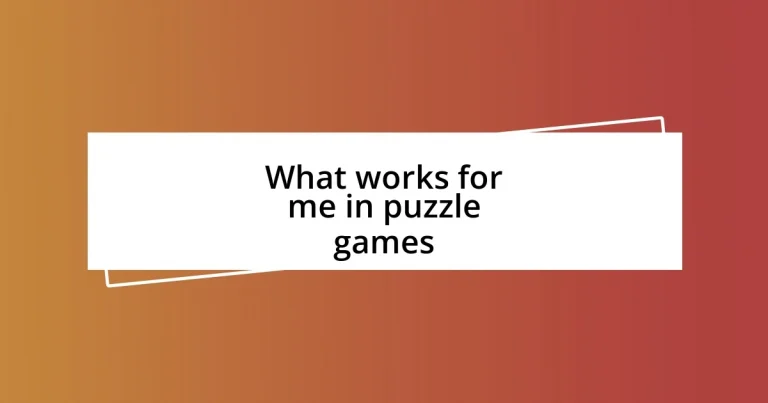Key takeaways:
- Puzzle games provide a satisfying sense of accomplishment and tap into innate problem-solving and creativity, enhancing mood and offering a mental workout.
- Effective strategies for success include breaking down problems, embracing mental flexibility, celebrating small wins, and managing time wisely to maintain enjoyment without overwhelming commitments.
- Personalizing the gaming experience through customization, community engagement, and selecting themes that resonate can significantly enhance immersion and enjoyment.
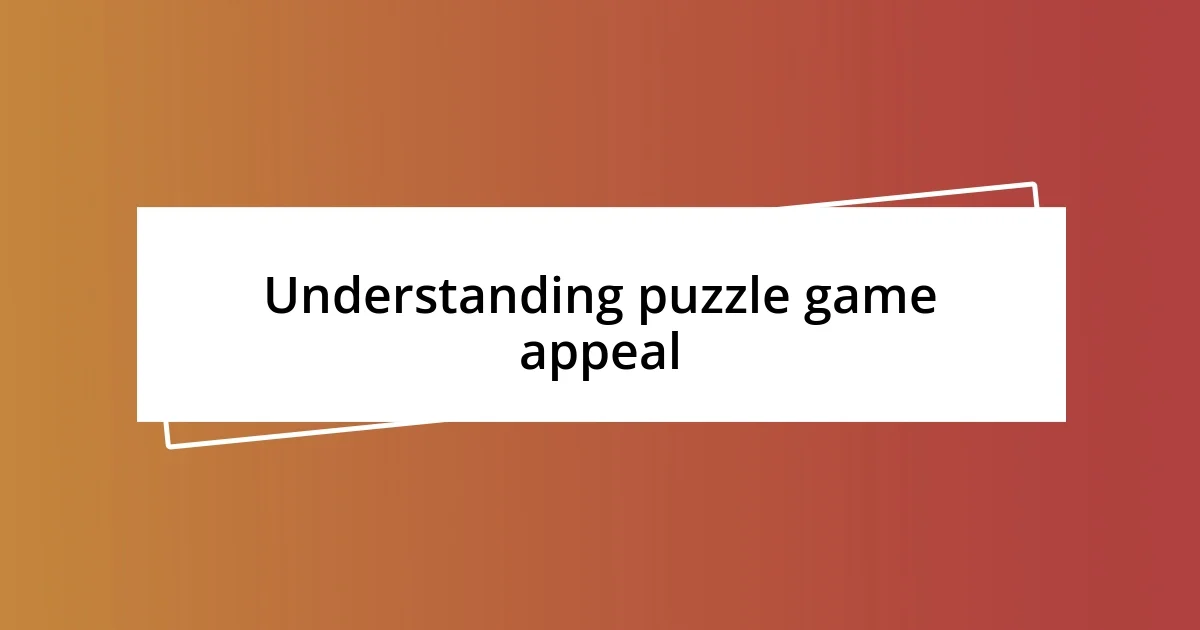
Understanding puzzle game appeal
When I think about the appeal of puzzle games, I can’t help but recall moments spent immersed in their enchanting challenges. There’s something incredibly satisfying about piecing together a complex problem, like when I finally solved a difficult level after what felt like endless attempts. That rush of accomplishment is hard to replicate elsewhere, don’t you think?
I often find myself reflecting on how these games tap into our innate desire for problem-solving and creativity. It’s almost like a thrilling mental workout that keeps my brain sharp and engaged. Have you ever noticed how a simple puzzle can transform your mood? I know that after a long day, indulging in a captivating puzzle game lifts my spirits and offers a comforting escape.
Another engaging aspect is the variety they offer; from word puzzles to elaborate escape rooms, there’s something for everyone. Each type invites you to not only think critically but also to experience joy in discovery—like when I stumbled upon a hidden solution I hadn’t considered before. Isn’t that what keeps us coming back for more? The blend of challenge and gradual mastery creates a unique euphoric cycle that many of us crave.
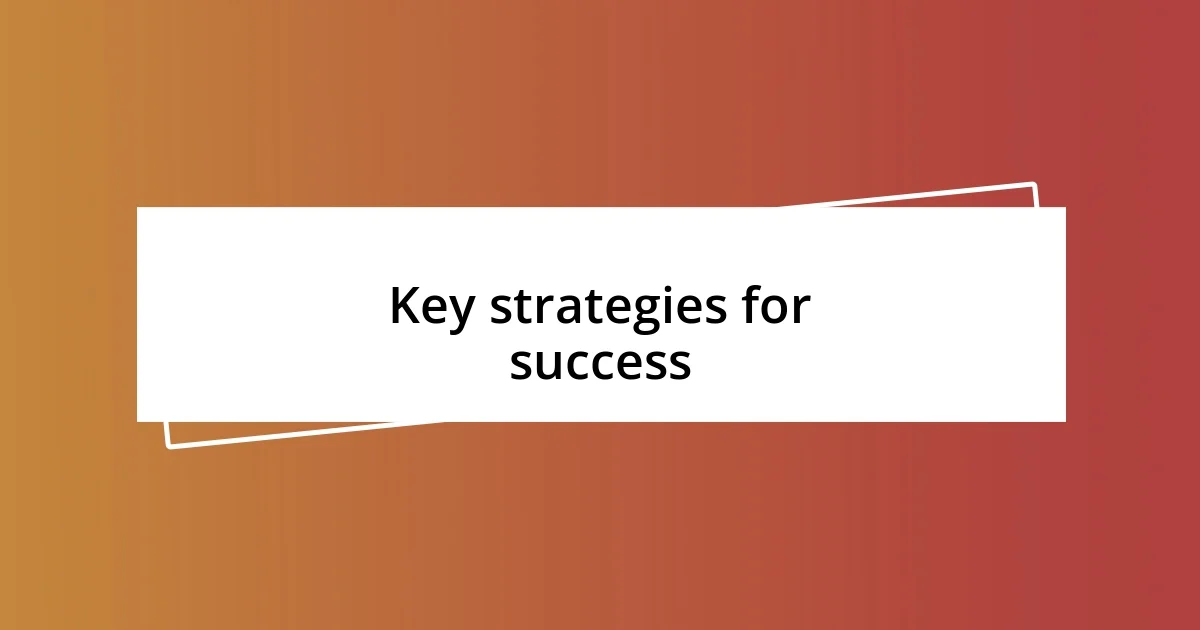
Key strategies for success
When it comes to succeeding in puzzle games, I’ve learned that patience can be my greatest ally. I can’t tell you how many times I’ve been stuck on a level, only to realize that stepping away for a bit often gives me a fresh perspective. It’s like allowing my mind to process the challenge subconsciously, which can lead to those “aha” moments I cherish. Each time I return, I find myself approaching the puzzle with renewed energy and sometimes even a new strategy.
Here are some key strategies I’ve found effective:
- Break Down the Problem: Instead of getting overwhelmed, I dissect the puzzle into smaller, manageable parts. This approach turns a daunting challenge into a series of simpler tasks.
- Stay Open to New Approaches: I try not to cling to what has worked before. Sometimes pivoting to a completely different strategy can be the key to success.
- Practice Mental Flexibility: Embracing a mindset where I can adapt to changing scenarios helps me stay engaged and ready to tackle whatever the game throws at me.
- Celebrate Small Wins: Whenever I complete a portion of a puzzle, I take a moment to appreciate the progress. This keeps my motivation high.
- Connect with the Community: Sharing experiences and strategies with fellow players not only expands my toolkit but also enriches my enjoyment of the games.
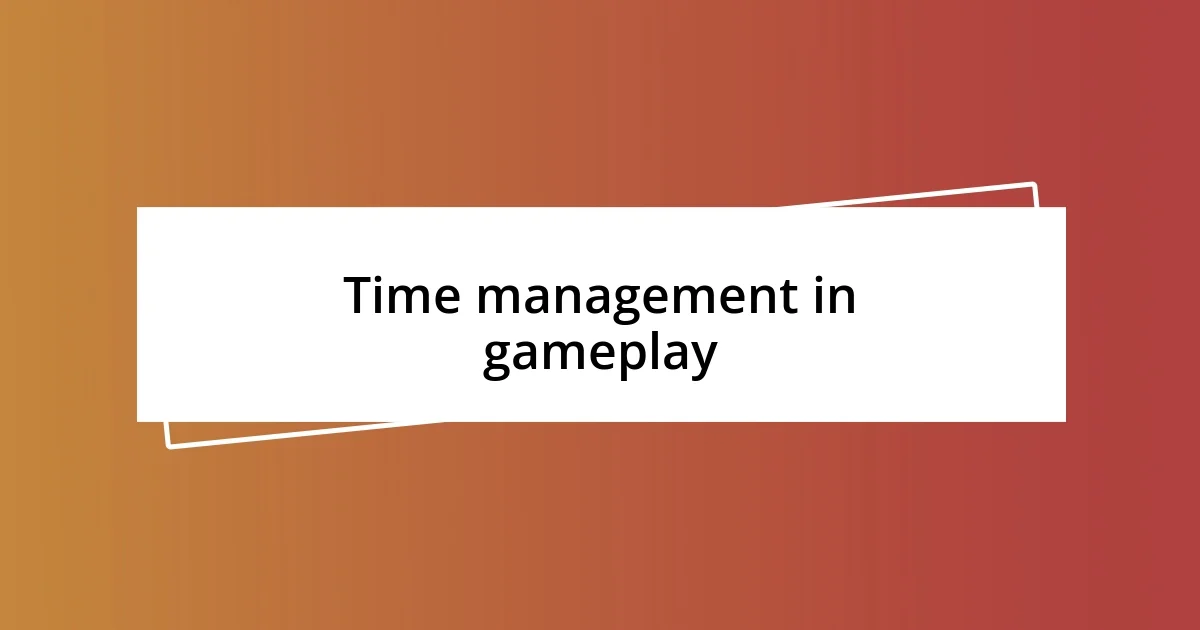
Time management in gameplay
Time management in puzzle games is an essential skill that I’ve come to appreciate over time. I remember a specific weekend when I spent hours on a single level, completely losing track of time. It felt exhilarating but also frustrating, as I had plans with friends that I almost blew off. Now, I’ve learned to set mini time limits for each session. This tactic helps me balance both gaming and my daily commitments.
While diving deep into a challenging puzzle, I emphasize the importance of pacing. I often ask myself, “Am I pushing too hard?” This reflection helps me gauge when to take a break or step back. For instance, I’ve found that after 30 minutes of dedicated play, I might be less effective. By taking short breaks, I return with a clearer mind and often discover solutions I previously overlooked. It’s fascinating how our brains work—sometimes a little space from the challenge opens up new pathways for creativity.
Adopting a structured approach has transformed my gameplay. Creating a simple plan each time I start helps me manage my focus, like deciding in advance how long I’ll spend on a tricky level. This balance between time and effort ensures my gaming remains enjoyable rather than a time sink, reinforcing the fun rather than allowing frustration to take hold.
| Strategy | Description |
|---|---|
| Set Time Limits | Allocate specific time blocks to keep gameplay enjoyable without sacrificing obligations. |
| Pacing | Monitor energy levels and take breaks to refresh your mind. |
| Create a Gameplay Plan | Outline goals for each play session to stay focused and proactive. |
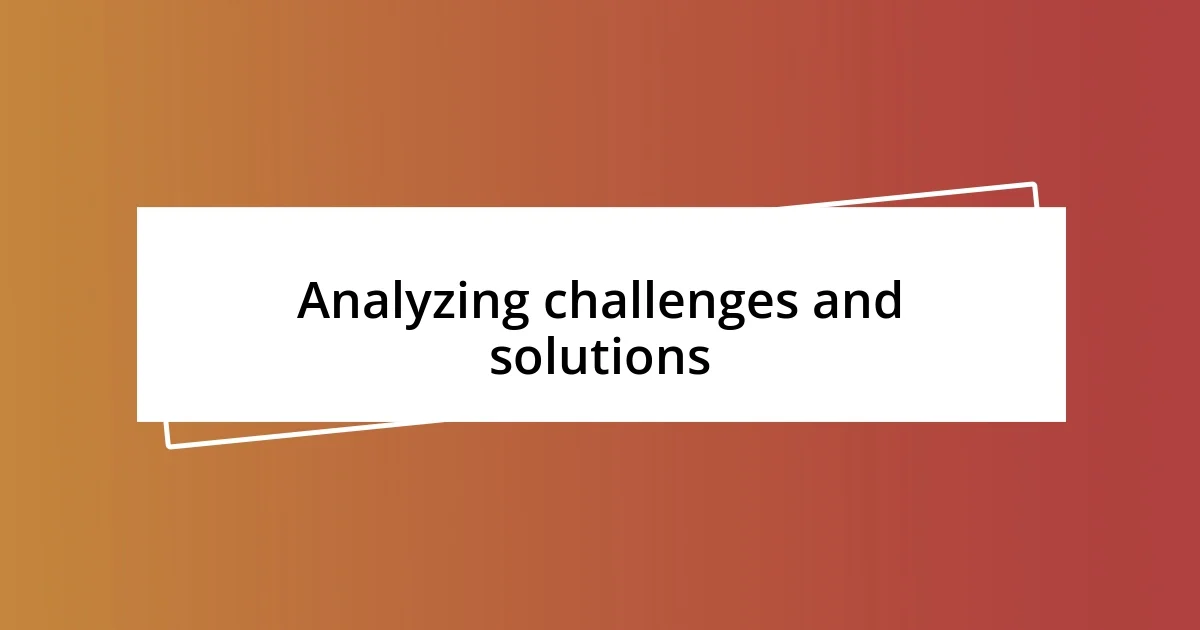
Analyzing challenges and solutions
Navigating the challenges in puzzle games often requires a shift in perspective. I recall an instance when a particularly tricky level had me rethinking my entire approach. It was frustrating, but I decided to jot down various strategies—almost like brainstorming for a school project. This method not only organized my thoughts but also revealed patterns I hadn’t noticed before. Have you ever written things down only to find solutions right there on the page?
One frequent hurdle I encounter is the urge to force a solution rather than explore diverse options. I found that asking myself guiding questions—like, “What if I tried this differently?”—can spark insights. The breakthrough came when I experimented with combinations I typically bypassed. There was a level that stumped me for days, only to be resolved by reshuffling my techniques. The satisfaction that followed was rewarding, highlighting how small adjustments can lead to significant breakthroughs.
Finding balance in problem-solving is equally vital. For example, when I get stuck, the temptation to keep pushing can be overwhelming. I’ve learned to recognize that moment of frustration as a cue to pause and reassess. During one of those frustrating runs, I stepped outside for fresh air, and the clarity that emerged was wondrous. It reinforced something I’ve come to view as essential: that stepping back can often lead to stepping forward.
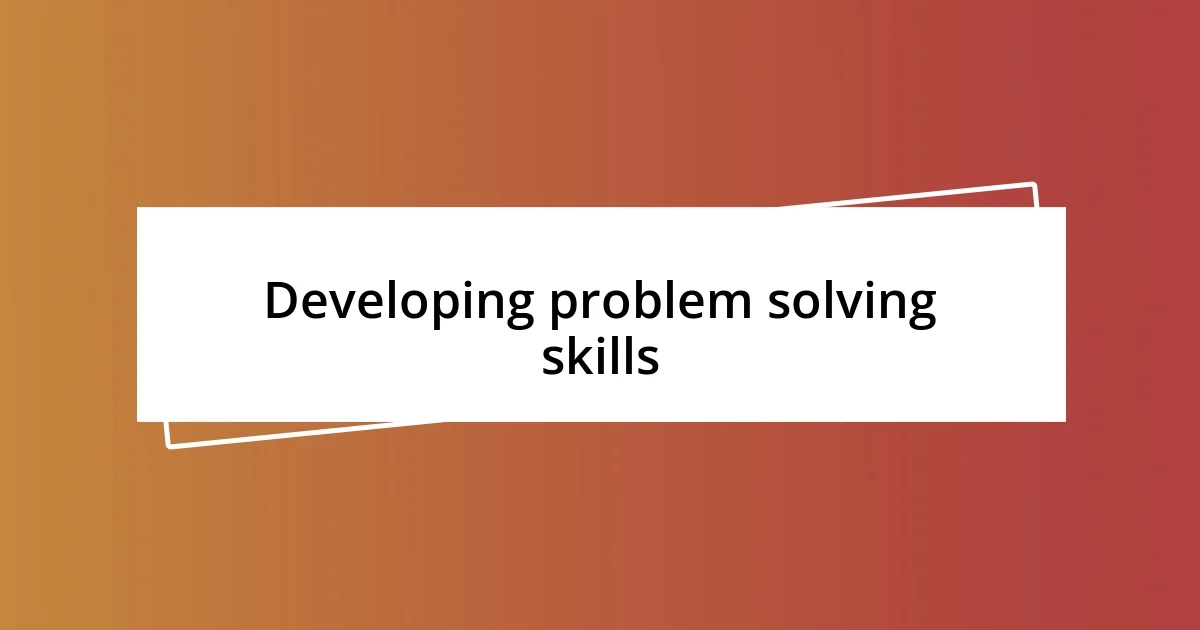
Developing problem solving skills
Solving puzzles has sharpened my problem-solving skills in unexpected ways. For instance, I remember a particularly intricate level where I felt completely stumped. Instead of spiraling into frustration, I decided to step away for a moment. That break was rejuvenating! It opened up my mind to new solutions, showing me just how essential it is to clear my head now and then. Have you ever noticed how fresh ideas often come when you least expect them?
A major takeaway for me has been the value of experimenting with multiple approaches. I often think back to an instance where I faced a dead end. I challenged myself, saying, “What if I tackle this from a completely different angle?” This mindset not only led to the solution I needed but also made the gameplay much more enjoyable. Embracing variety in strategies enriches the experience and unveils connections I hadn’t considered before.
Reflecting on my journey, I’ve realized that frustration can be a powerful teacher. When I find myself banging my head against a wall, I pause to ask why. Is it because I’m too focused on one method? A memorable example was a level I struggled with for a week. After reevaluating my tactics, I shifted gears. That moment of self-reflection was crucial; it taught me that sometimes, stepping back is the best way to move forward. Doesn’t it feel rewarding when you finally figure it out?
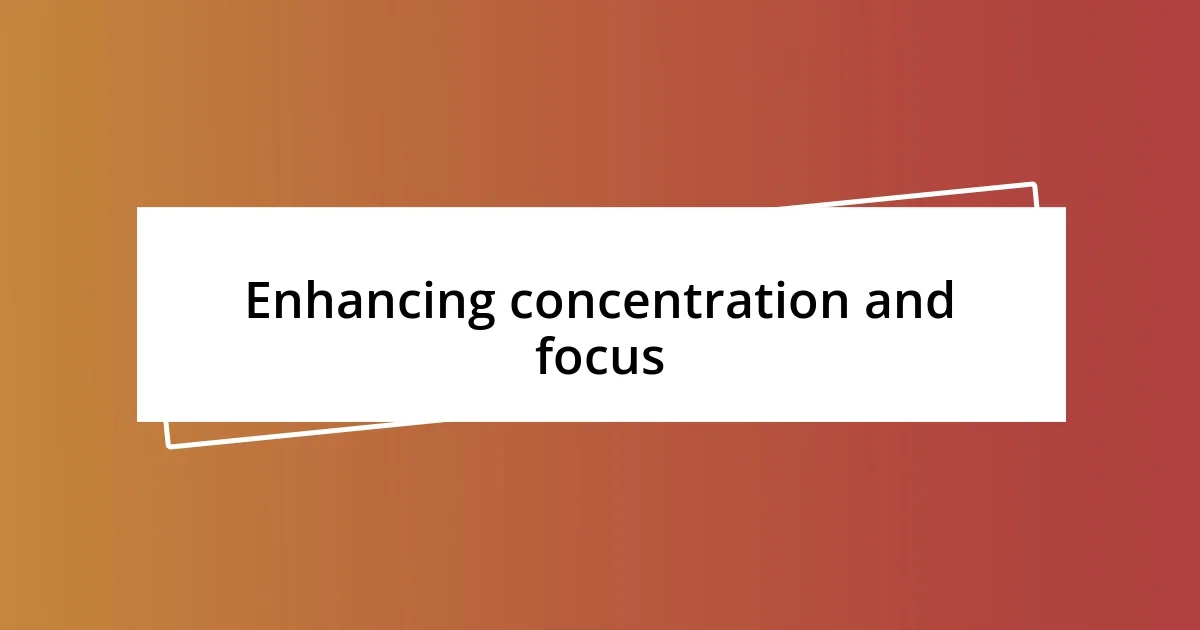
Enhancing concentration and focus
Enhancing concentration can feel challenging, especially when distractions pull me in different directions. I remember one particular evening, immersed in a complex puzzle, my attention constantly shifting to my phone buzzing nearby. So, I decided to turn on some calming instrumental music, which helped me dive deeper into the task at hand. Isn’t it interesting how changing our environment can dramatically improve our focus?
I’ve also discovered the power of setting small goals while playing. For instance, instead of tackling an entire puzzle at once, I focus on just one section. This not only makes it less daunting but also enhances my concentration, allowing me to engage with each element more meaningfully. Have you ever tried breaking down a challenge into bite-sized pieces? It’s almost like discovering new layers within the game.
Another aspect that aids my focus is the method of mindfulness. While I play, I consciously remind myself to breathe and center my thoughts, blocking out any lingering distractions. There was a time when I used breathing exercises during gameplay; it felt like an internal reset that opened my mind to possibilities I hadn’t considered. This practice not only enhances my concentration but also adds a sense of calm during intense moments. How about you—have you explored mindfulness in your gaming experiences?
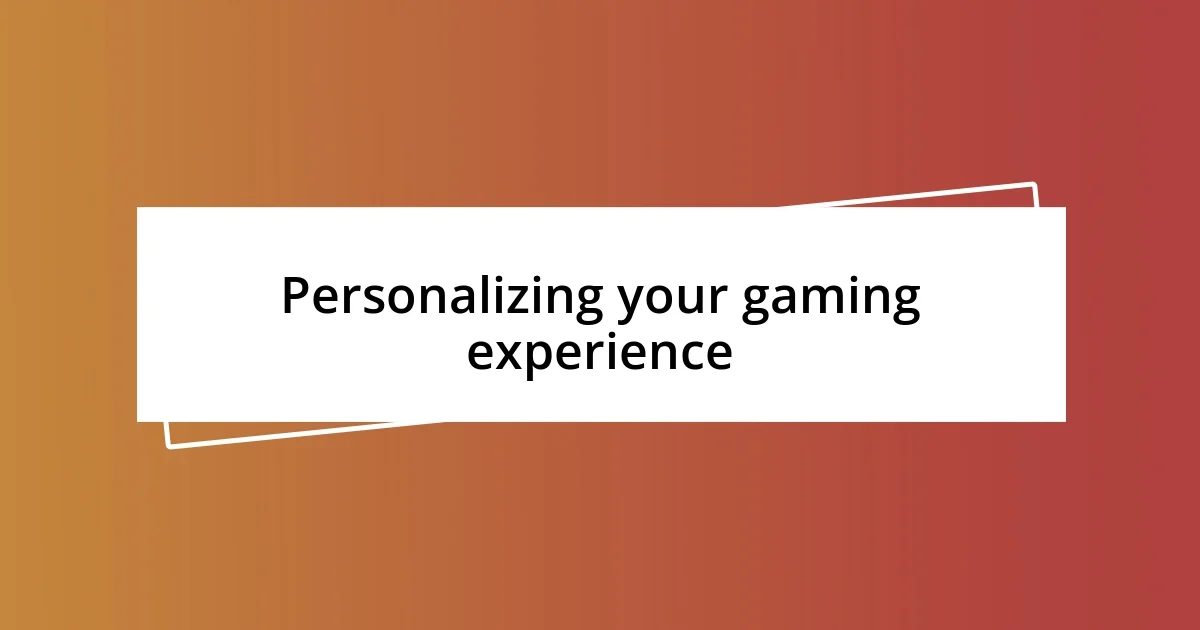
Personalizing your gaming experience
To personalize my gaming experience, I often delve into customizing the settings and features of the puzzle games I play. A while back, I found myself frustrated with the default layout in a game that involved spatial reasoning. Adjusting settings to my liking felt like an immediate relief, making the gameplay smoother and more enjoyable. Have you ever felt like a game wasn’t quite “yours” until you made those little tweaks?
I also embrace the social aspect of puzzle gaming, choosing to share my progress and strategies with friends. One time, I joined an online forum focused solely on a game I loved. Engaging with others, exchanging tips, and even playtesting strategies brought a truly collaborative spirit to my experience. Doesn’t it feel great to learn from others while contributing your own insights?
Additionally, I’ve discovered that choosing themes and levels that resonate with my interests can enhance immersion. For example, I remember tackling a puzzle set in a whimsical forest, which sparked my imagination and made solving the challenges more rewarding. It’s fascinating how rich visuals or intriguing storylines can elevate that sense of personal connection to a game. Have you found particular themes that enhance your enjoyment and keep you engaged?












